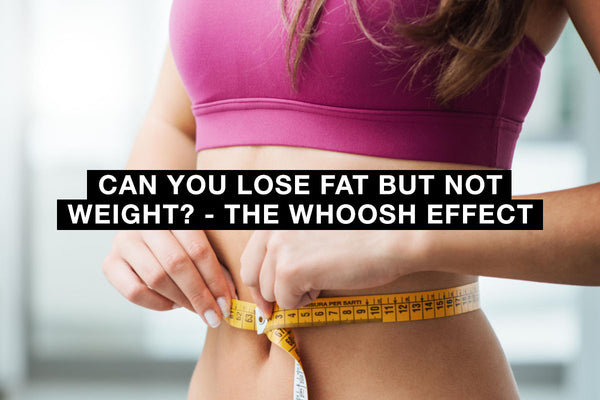On the surface, weight loss seems pretty straightforward -- eat fewer calories than your body requires to maintain its current size, and you’ll lose weight.
And, while many of our transformation challenge contestants have realized consistent weight loss through a combination of diet and exercise, there inevitably are those outliers who seem to be doing everything right, yet can’t seem to get the number on the scale to go down.
What you might not realize is that while the number on the scale isn’t going down, you could actually be losing fat.
How can this be?
A little something termed the “whoosh” effect.
What is the Whoosh Effect?
The “whoosh” effect is a concept popularized by Lyle McDonald that describes how a fat cell can lose fatty acids, but replaces those burned triglycerides with water.
This creates a soft or “squishy” appearance due to the increased water retention in the body.
During this phase, the body technically hasn’t lost fat, but it can’t be seen in the individual’s appearance or noted on a body weight scale.
Then, as the body normalizes, there is a “whooshing” that takes place where the fat cells release the extra water they were retaining, causing an individual to drop several pounds overnight (or during the course of a trip to the bathroom).
Is the WHOOSH Effect Legit?
There hasn’t been much research to date investigating a possible “whooshing” of water into fat cells. Truth be told, it would be rather complex (and expensive) to track that in human subjects.
But, ask any well-seasoned coach or personal trainer and they’ll be able to tell you just how wild some of their clients’ daily water weight fluctuations can be.
Changes to an individual’s intake of water, carbohydrates, sodium, potassium, and other nutrients can significantly impact how much water they retain from one day to another, which is why it’s important to take a weekly average of your weight, not just a random day here or there.
How much stress an individual is under also affects how much water the body retains.
Chronic stress is a known metabolism crusher. Individuals who are chronically stressed are known to have:
- Impaired energy metabolism
- Disrupted sleep
- Worse insulin sensitivity
- Poor carbohydrate utilization and storage
- Increased fat storage
- Increased water retention
Chronic stress is also known to impair leptin/ghrelin signaling, which basically means you crave high-calorie, high-sugar foods and feel less satiated following a meal.
This is why it is so important to practice stress management techniques and try to limit what stressors you expose yourself to each day (some are unavoidable, but others are almost entirely avoidable).
Moving beyond diet and stress, certain supplements can increase the body’s concentration of water. Notable examples include glycerol, betaine, and creatine.
It should also be noted though, that these supplements promote water retention within muscle cells, it’s highly unlikely they’re contributing to the whooshing effect present in fat cells. Still, these supplements increase water concentration in the body, which could lead to increased body weight.
However, the body will normalize and this water weight will correct itself.
Furthermore, supplementation with osmolytes (including glycerol) is known to reduce urination volume and increase hydration.[1,2]
Now, when lipolysis (the breakdown of stored fatty acids) occurs, fatty acids and glycerol are generated.[3] Fatty acids can be activated and then oxidized (burned) for energy. Glycerol, however, is not.
Since glycerol encourages cells to absorb water, it is possible (theoretically) that the residual glycerol in adipocytes is pulling in water to make up for the displaced fatty acids.
Plus, seeing as the human body (including its individual cells) is always seeking homeostasis, it stands to reason that when cells lose some portion of their mass, they would replace it with something else, which in this case, is water.
What Does This Mean for Me?
The human body is a fascinatingly (and sometimes frustratingly) complex entity. Just when you expect it to do one thing, oftentimes it will do something entirely unexpected (as in the case of whooshing).
The important thing is to understand that over the long term, fat cells that may temporarily store water will ultimately “deflate” and shrink.
Note: very rarely do fat cells actually die off during a weight loss phase. More often than not (i.e. almost always), they shrink.
Furthermore, it’s important to remember that dieting (eating less) is stressful to the body in more ways than one -- physically, emotionally, hormonally.
This again brings us face to face with the loathsome entity that is cortisol.
Chronically elevated cortisol levels can (and will) interfere with fat loss and body composition.
Therefore, it’s imperative that you try to mitigate your exposure to stress during your transformation as well as work on your ability to manage stress.
At the end of the day, whoosh or no whoosh, calories do reign supreme, which means if you do want to lose weight, you will need to track your calories and remain in a calorie deficit. Subtle fluctuations in water weight are both normal and expected when dieting.
As such, don’t be surprised if you experience a “plateau” during the course of your transformation challenge. Realize that you may still be losing fat while your body is retaining water.
In the end, though, the body will normalize and flush the excess water as it adapts to its new body weight.
References
- Koenigsberg PS, Martin KK, Hlava HR, Riedesel ML. Sustained hyperhydration with glycerol ingestion. Life Sci. 1995;57(7):645-53. doi: 10.1016/0024-3205(95)00316-x. PMID: 7637536.
- Koehler, K., Braun, H., Marees, M., Geyer, H., Thevis, M., Mester, J., & Schaenzer, W. (2011). Urinary excretion of exogenous glycerol administration at rest. Drug Testing and Analysis, 3(11-12), 877-882. https://doi.org/10.1002/dta.355
- VAUGHAN M. The production and release of glycerol by adipose tissue incubated in vitro. J Biol Chem. 1962 Nov;237:3354-8. PMID: 13996476.






